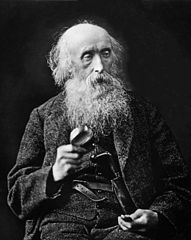
Carelessness, thy name is T. T. Martin. Martin (1862–1939) was, as you’ll recall, the Mississippi evangelist described by Ronald L. Numbers in The Creationists (1992) as “among the earliest and most outspoken critics of evolution…an itinerant evangelist with a reputation for combining doctrinal fanaticism with compassionate Christianity.” He is perhaps best remembered for his unforgettably titled indictment of the teaching of evolution Hell and the High Schools (1923). Here at the Science League of America I’ve mentioned his attempting to hoax Maynard Shipley (the founder of the original Science League of America) and his being hoaxed in turn in Dayton, Tennessee, by H. L. Mencken and Henry M. Hyde. More recently, I investigated his use of a quotation from “Sir Roredick Murchison”—a typographical error, obviously, for Sir Roderick Murchison (1792–1871)—in chapter 5 of Hell and the High Schools, entitled “Evolution Repudiated by Great Scientists and Scholars.”
In the same chapter, I noticed the following passage, attributed to Francis M. Balfour: “All these facts contradict the crude ideas of those so-called naturalists who state that one species can be transformed into an other [sic] in the course of generations” (emphasis in original). Now, I don’t know about you, but when I think of people named Balfour who discuss evolution, I think of Arthur Balfour (1848–1930), the British Conservative politician who served as Prime Minister from 1902 to 1905. Keenly interested in philosophy (as Tim Madigan described in Philosophy Now in 2010), writing A Defense of Philosophical Doubt (1879), The Foundations of Belief (1895), Theism and Humanism (1914), and Theism and Thought (1923), he held a high view of Darwin and accepted evolution, albeit with a progressivist inflection, but argued that Thomas Henry Huxley’s scientific naturalism was unstable. (Similar arguments were launched by C. S. Lewis and, in our day, Alvin Plantinga, but Balfour may have been the pioneer.)
But it didn’t seem likely that the philosophical Arthur Balfour would be arguing about the nitty-gritty biological details of speciation, or that T. T. Martin—sloppy though he was—would manage to write “Francis M.” where he intended to write “Arthur.” And indeed there was a Francis M. (for Maitland) Balfour, who was Arthur’s younger brother. Born in 1851, he died tragically young in 1882, while attempting to climb Mont Blanc. Before that, however, he was regarded as a leading scientist of his day. The younger Balfour was elected as a Fellow of the Royal Society in 1878, published a treatise on comparative embryology in 1880 and 1881, was awarded the Royal Medal by the Royal Society for his work on animal morphology in 1881, and was named to a chair of animal morphology at Cambridge University in 1882, although he died before he was able to take up his duties. Writing in 2003, the evolutionary developmental biologist Brian K. Hall described him as “a founder of evolutionary embryology.”
As a founder of evolutionary embryology, though, Francis Balfour doesn’t really sound like a scientist who repudiated evolution. On the second page of the first volume of his Comparative Embryology (1880), for example, he writes, “It has long been recognized that the embryos and larvae of the higher forms of each group pass, in the course of their development, through a series of stages in which they more or less completely resemble the lower forms of the group.” And the explanation for recapitulation, according to Balfour, is evolutionary: “This remarkable phenomenon receives its explanation on Mr Darwin’s theory of descent,” ultimately from “the laws of heredity and variation.” (Balfour didn’t think that it was possible to infer phylogeny directly from embryology, though: “the embryological record, as it is usually presented to us, is both imperfect and misleading.”) So that’s two Balfours, Arthur and Francis, who seem unlikely sources of the passage quoted by Martin.
Looking at the creationist literature, I found that in The Other Side of Evolution (1903), Alexander Patterson credited Francis M. Balfour with a similar passage: “All these facts that fall under our observation contradict the crude ideas of those so-called naturalists, who state that one species can be transmitted into another in the course of generations.” Luther Tracy Townsend in Bible Theology and Modern Thought (1883) quotes a Professor Balfour—no first name—as saying “All these facts contradict the crude ideas of those so-called naturalists, who state that one species can be transmuted into another in the course of generations.” Joseph Henry Wythe in The Agreement of Science and Revelation (1872) quotes a whole paragraph from Professor Balfour—no first name—beginning with the varieties of Brassica (cabbage, cauliflower, broccoli, etc.) and culminating with a similar passage. And Henry Tullidge in Triumphs of the Bible (1863) offers the same paragraph from Professor Balfour, as well as a reference: Botany and Religion.
It turns out, then, that it’s neither Arthur nor Francis but John Hutton Balfour (above; 1808–1884) who was quoted all along, from his Botany and Religion; or, Illustrations of the Works of God in the Structure, Functions, Arrangement, and General Distribution of Plants (third edition, 1859—earlier editions were entitled Phyto-Theology), which states, “All these facts show the permanence of species in nature, and contradict the crude ideas of those so-called naturalists, who state that one species can be transmuted into another in the course of generations.” Balfour was a respectable scientist, a professor of botany at the universities of Glasgow and then Edinburgh (where his competitor for the post was Darwin’s friend Joseph Dalton Hooker), so it would have been reasonable to cite him as authoritative circa 1859. But of course, it was anachronistic for Martin to cite a sixty-four-year-old book, or even for Patterson to cite a forty-four-year-old book, as indicative of current scientific opinion, even if they had rendered the author’s name correctly.

